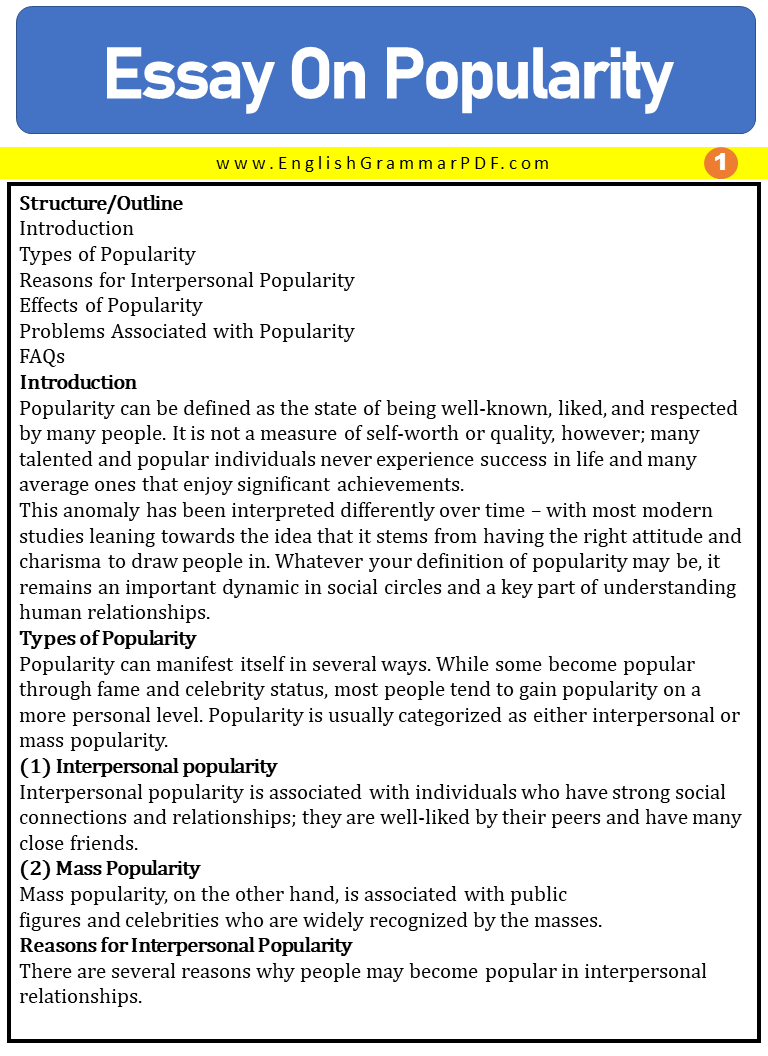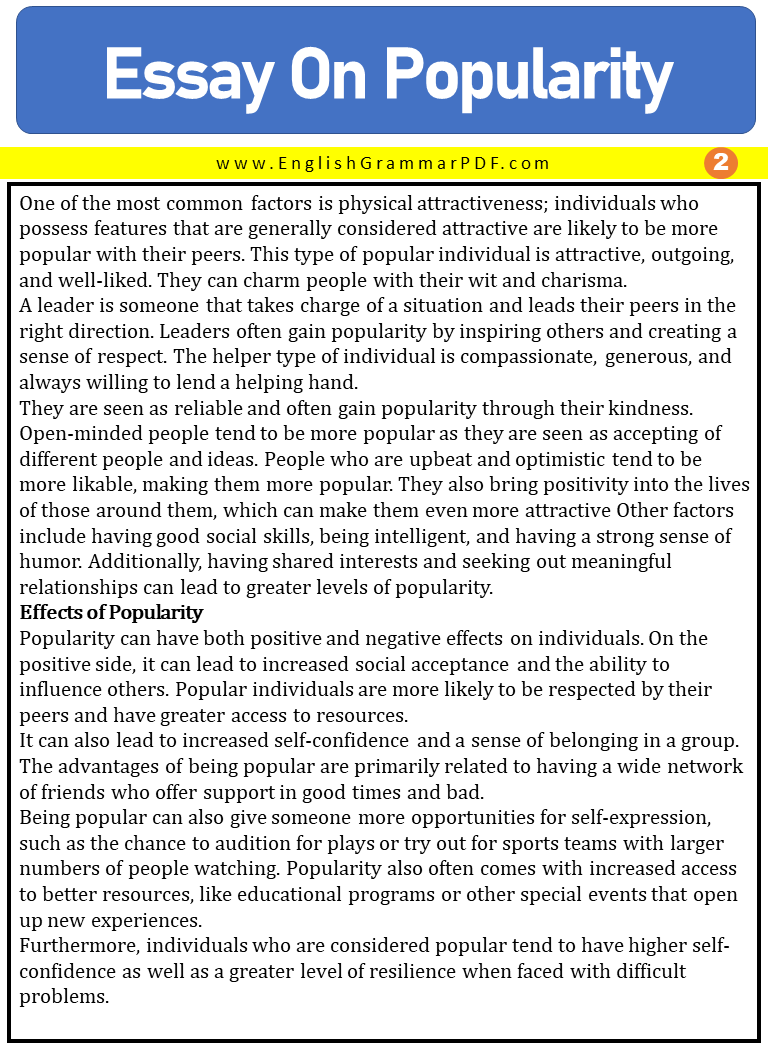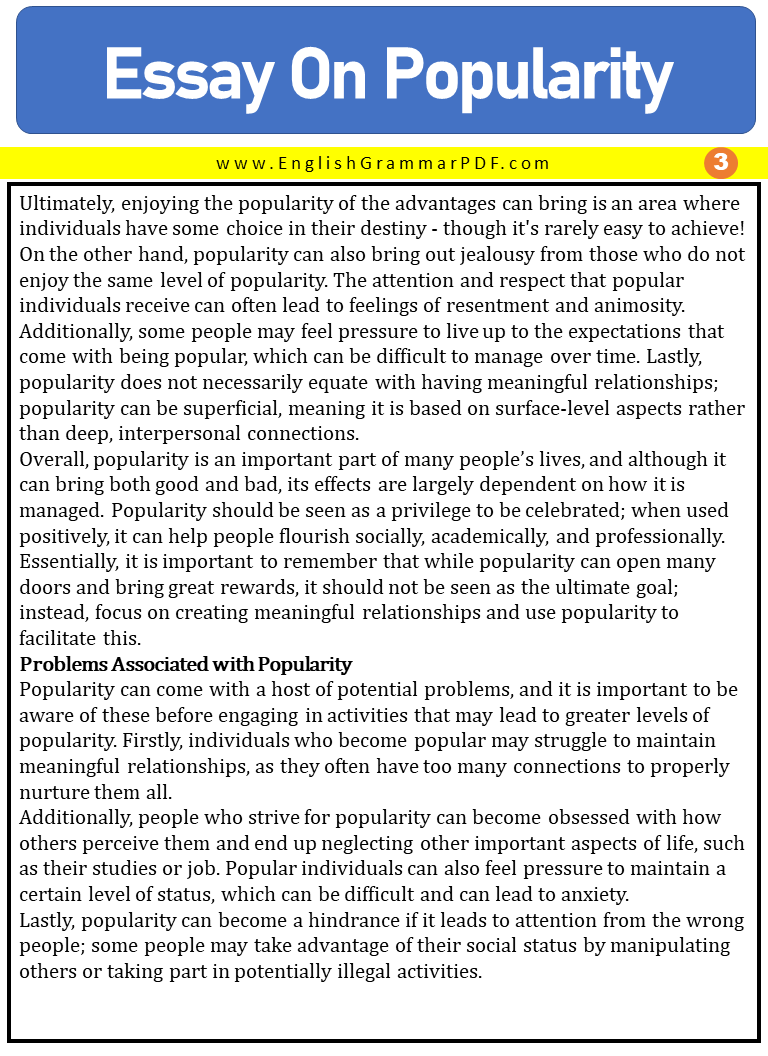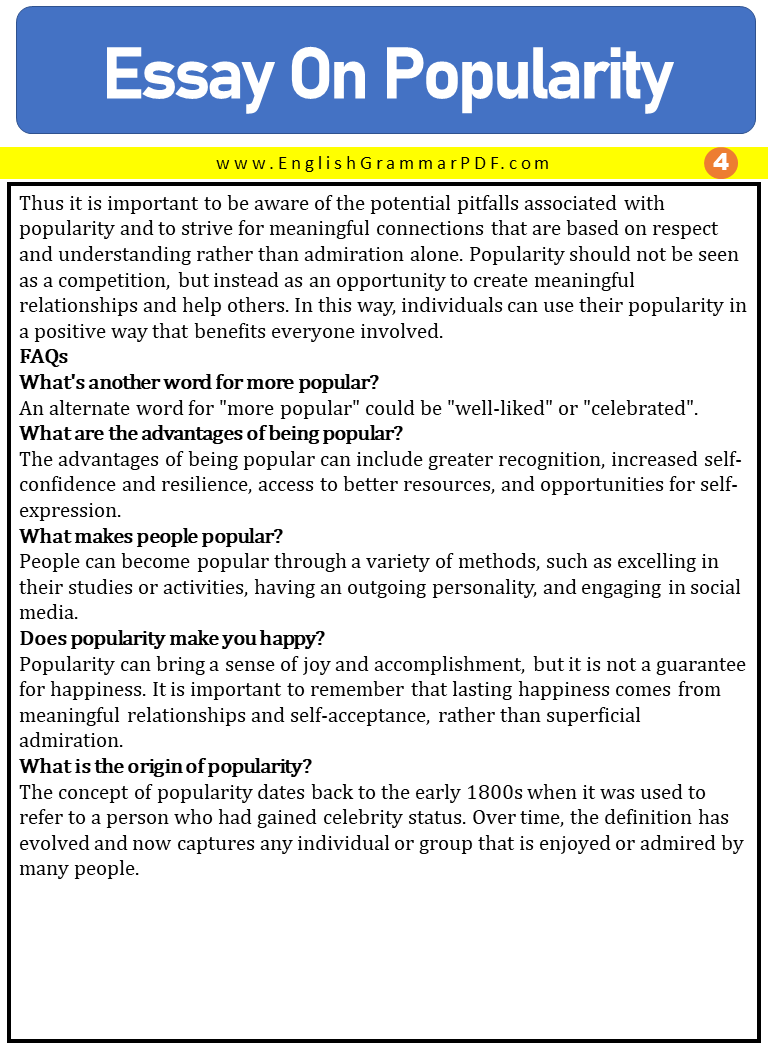Essay On Popularity – Structure/Outline
- Introduction
- Types of Popularity
- Reasons for Interpersonal Popularity
- Effects of Popularity
- Problems Associated with Popularity
- FAQs
Introduction
Popularity can be defined as the state of being well-known, liked, and respected by many people. It is not a measure of self-worth or quality, however; many talented and popular individuals never experience success in life and many average ones that enjoy significant achievements.
This anomaly has been interpreted differently over time – with most modern studies leaning towards the idea that it stems from having the right attitude and charisma to draw people in. Whatever your definition of popularity may be, it remains an important dynamic in social circles and a key part of understanding human relationships.
Types of Popularity
Popularity can manifest itself in several ways. While some become popular through fame and celebrity status, most people tend to gain popularity on a more personal level. Popularity is usually categorized as either interpersonal or mass popularity.
(1) Interpersonal popularity
Interpersonal popularity is associated with individuals who have strong social connections and relationships; they are well-liked by their peers and have many close friends.
(2) Mass Popularity
Mass popularity, on the other hand, is associated with public figures and celebrities who are widely recognized by the masses.
Reasons for Interpersonal Popularity
There are several reasons why people may become popular in interpersonal relationships. One of the most common factors is physical attractiveness; individuals who possess features that are generally considered attractive are likely to be more popular with their peers. This type of popular individual is attractive, outgoing, and well-liked. They can charm people with their wit and charisma.
A leader is someone that takes charge of a situation and leads their peers in the right direction. Leaders often gain popularity by inspiring others and creating a sense of respect. The helper type of individual is compassionate, generous, and always willing to lend a helping hand.
They are seen as reliable and often gain popularity through their kindness. Open-minded people tend to be more popular as they are seen as accepting of different people and ideas. People who are upbeat and optimistic tend to be more likable, making them more popular. They also bring positivity into the lives of those around them, which can make them even more attractive Other factors include having good social skills, being intelligent, and having a strong sense of humor. Additionally, having shared interests and seeking out meaningful relationships can lead to greater levels of popularity.
Effects of Popularity
Popularity can have both positive and negative effects on individuals. On the positive side, it can lead to increased social acceptance and the ability to influence others. Popular individuals are more likely to be respected by their peers and have greater access to resources.
It can also lead to increased self-confidence and a sense of belonging in a group. The advantages of being popular are primarily related to having a wide network of friends who offer support in good times and bad.
Being popular can also give someone more opportunities for self-expression, such as the chance to audition for plays or try out for sports teams with larger numbers of people watching. Popularity also often comes with increased access to better resources, like educational programs or other special events that open up new experiences.
Furthermore, individuals who are considered popular tend to have higher self-confidence as well as a greater level of resilience when faced with difficult problems. Ultimately, enjoying the popularity of the advantages can bring is an area where individuals have some choice in their destiny – though it’s rarely easy to achieve!
On the other hand, popularity can also bring out jealousy from those who do not enjoy the same level of popularity. The attention and respect that popular individuals receive can often lead to feelings of resentment and animosity.
Additionally, some people may feel pressure to live up to the expectations that come with being popular, which can be difficult to manage over time. Lastly, popularity does not necessarily equate with having meaningful relationships; popularity can be superficial, meaning it is based on surface-level aspects rather than deep, interpersonal connections.
Overall, popularity is an important part of many people’s lives, and although it can bring both good and bad, its effects are largely dependent on how it is managed. Popularity should be seen as a privilege to be celebrated; when used positively, it can help people flourish socially, academically, and professionally.
Essentially, it is important to remember that while popularity can open many doors and bring great rewards, it should not be seen as the ultimate goal; instead, focus on creating meaningful relationships and use popularity to facilitate this.
Problems Associated with Popularity
Popularity can come with a host of potential problems, and it is important to be aware of these before engaging in activities that may lead to greater levels of popularity. Firstly, individuals who become popular may struggle to maintain meaningful relationships, as they often have too many connections to properly nurture them all.
Additionally, people who strive for popularity can become obsessed with how others perceive them and end up neglecting other important aspects of life, such as their studies or job. Popular individuals can also feel pressure to maintain a certain level of status, which can be difficult and can lead to anxiety.
Lastly, popularity can become a hindrance if it leads to attention from the wrong people; some people may take advantage of their social status by manipulating others or taking part in potentially illegal activities.
Thus it is important to be aware of the potential pitfalls associated with popularity and to strive for meaningful connections that are based on respect and understanding rather than admiration alone. Popularity should not be seen as a competition, but instead as an opportunity to create meaningful relationships and help others. In this way, individuals can use their popularity in a positive way that benefits everyone involved.
FAQs
What’s another word for more popular?
An alternate word for “more popular” could be “well-liked” or “celebrated”.
What are the advantages of being popular?
The advantages of being popular can include greater recognition, increased self-confidence and resilience, access to better resources, and opportunities for self-expression.
What makes people popular?
People can become popular through a variety of methods, such as excelling in their studies or activities, having an outgoing personality, and engaging in social media.
Does popularity make you happy?
Popularity can bring a sense of joy and accomplishment, but it is not a guarantee for happiness. It is important to remember that lasting happiness comes from meaningful relationships and self-acceptance, rather than superficial admiration.
What is the origin of popularity?
The concept of popularity dates back to the early 1800s when it was used to refer to a person who had gained celebrity status. Over time, the definition has evolved and now captures any individual or group that is enjoyed or admired by many people.
Essay On Popularity (Pictures and PDF)




Related: Essay On Realism
Download this essay in PDF, below.


